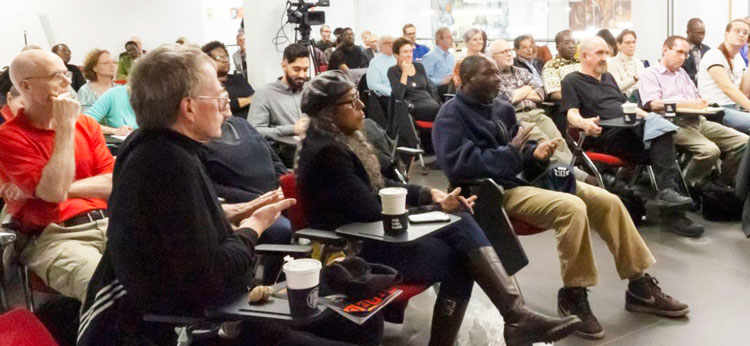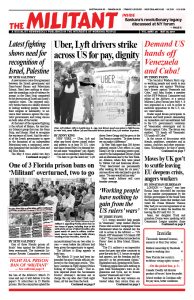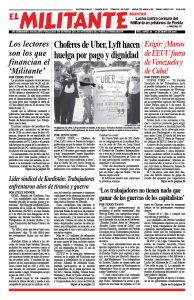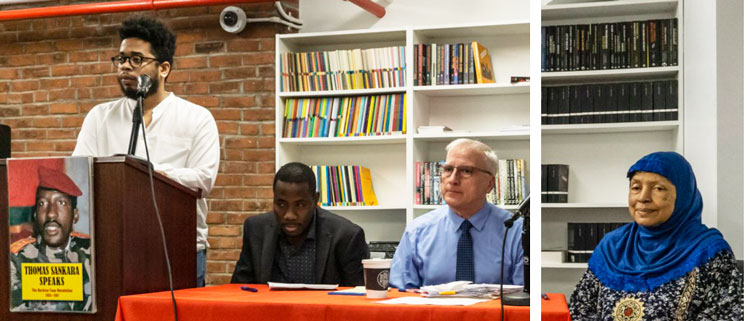NEW YORK — “No matter where we live, Europe, Africa, even here in the United States, we have the same common enemy — the imperialist system,” said Arouna Saniwidi, who chaired a panel sponsored by and held at the People’s Forum here May 5. The topic was “Thomas Sankara’s Revolutionary Legacy.” Sankara was the leader of the 1983-87 revolution in the West African country of Burkina Faso, a former French colony.
“Sankara was fighting for our dignity, for our people to be able to decide our future” amid the destruction wrought by colonialism, said Saniwidi, a leader in New York of the Burkinabe organization Le Balai Citoyen. “Sankara said we don’t need the help of the colonialists, who give us $1 today to pick up $2 tomorrow.”

Some 65 people attended, including Burkinabe living in New York, students, Uber drivers, members of workers organizations, and some hearing about Sankara for the first time. Volunteers translated the meeting into French.
Manolo de los Santos, executive director of the People’s Forum, welcomed everyone. We’re here to talk about Sankara’s “relevancy for the 21st century,” he said. “Sankara was a revolutionary, a communist, who provides an example for Africa and beyond.” De los Santos encouraged people to stop by a Pathfinder books table at the event. “It’s an honor to collaborate” with those who promote Pathfinder books by Sankara, Malcolm X, and Cuban revolutionaries, he said.
Panelist Asha Samad-Matias, a professor at City College of New York, described meeting Sankara when he addressed the United Nations and spoke at City College in October 1984. “He was a young leader they could not buy off. A leader who could just sit and talk to anyone,” she said.
The book Women’s Liberation and the African Freedom Struggle containing Sankara’s March 1987 International Women’s Day speech is “remarkable,” Samad said. “Sankara said women have to demand, and mobilize with others, to get their needs. The democratic and popular revolution he led helped create conditions for women to advance the fight for their rights.”
Peter Thierjung, a member of the Socialist Workers Party, said the African continent is in turmoil, from Algeria, where millions in the streets forced the president to resign, to Ethiopia, Sudan, and beyond. It’s a different continent than at Sankara’s time, he said, “but the fundamental problems remain.”
An example, Thierjung said, is Burkina Faso itself, where in 2014 massive protests succeeded in ousting its ruler, Blaise Compaore. In 1987, he organized the coup that destroyed the revolutionary government led by Thomas Sankara and assassinated him. Today Compaore is gone, “the face has changed, but not the regime.”
Sankara’s political leadership remains an example not just in Africa but in the U.S., where there is also turmoil due to unrelenting attacks on working people. These include assaults on workers — including immigrants from Burkina Faso, Mali, Bangladesh, Eastern Europe, and elsewhere, as well as U.S.-born workers — who are among the 100,000 taxi, Uber, Lyft and other drivers in New York City. In their competition for profits, he said, these companies pit drivers against each other.
Sankara an example for the U.S.
“Just think about what could be done if these workers came together in one union that fought for all drivers,” Thierjung said. “That would be like Sankara’s course under conditions here in New York City.”
As a young man Sankara was sent for military training to Madagascar, where a 1972 uprising toppled an unpopular regime. That experience, Thierjung said, had a deep impact on Sankara. He met students there who had been part of the 1968 prerevolutionary upsurge in France. He was introduced to the writings of Karl Marx and V.I. Lenin.
Sankara did not reject Marxism as a set of “European ideas,” alien to the freedom struggle in Africa, but saw them as necessary to forging a road forward. “We wish to be the heirs of all the world’s revolutions,” he said, from the American and French revolutions of the late 1700s, to “the great [Russian] revolution of October 1917,” to more recent revolutions in Cuba, Grenada, and elsewhere.
What marked Sankara above all, Thierjung said, was his confidence in the capacities of ordinary people to transform themselves and all of society in the course of a revolutionary struggle.
In a country where more than 80 percent of the population are peasants, Sankara led the revolutionary government to implement a land reform and organized farmers to boost Burkina Faso’s food self-sufficiency. It launched a vaccination campaign to combat measles, yellow fever and meningitis that reached 2.5 million children within a matter of weeks, something the World Health Organization said was impossible.
Construction projects were launched to build irrigation dams, dig wells for drinking water, and build schools and housing. Workers were mobilized to build roads and a railway tying together toilers from one end of the country to the other. All this was done by the solidarity and voluntary labor of the Burkinabe people, Thierjung said.
“The most important thing for us,” Sankara said in a 1985 interview, “is the transformation of people’s attitudes… Never again will the wealth of our country belong to a minority. It belongs to the majority, a majority that speaks its mind.” Ending “the myth of getting rich through a dog-eat-dog struggle” is central to the revolution’s goals, he said in a speech on its fourth anniversary.
Sankara’s final political fight
In the last months of his life, Thierjung said, Sankara began “a public political fight to keep the revolution on track” in face of forces in the National Council of the Revolution seeking to reverse its course. “He knew this could cost him his life. He was not naïve.”
The revolution faced counterrevolutionary pressures of both French and U.S. imperialism. They stoked divisions within the leadership and ranks, some of whom were seeking to advance their own ambitions or advance self-serving political schemes.
The revolution is only worthwhile if it contributes to improving people’s lives and control over their destiny, Sankara said. Above all, revolutionaries are those who are loyal to the interests of working people — the most self-sacrificing and determined in advancing those interests.
Thierjung said that Sankara was adamant that the revolution could not be imposed on the masses. “The democratic and popular revolution needs a convinced people, not a conquered people — a convinced people, not a submissive people passively enduring their fate,” Sankara said in a 1987 speech.
He was determined to build a new political party to help guarantee the future of the revolution, Thierjung said. It wouldn’t be a vote catching, electoral machine, but an organization of vanguard fighters proving their capacities in practice to advance the revolution — those who were winning the confidence of ordinary people in struggle.
That remains the task today in Africa, in the U.S., and worldwide, Thierjung said. He encouraged everyone to read and study Sankara’s speeches, to learn the lessons of the 1983-87 revolution.
During the discussion, one participant said he hoped to see “more Sankaras in my lifetime,” and to be able to prevent them from being assassinated.
Mary-Alice Waters, a Socialist Workers Party leader, said there is never any guarantee revolutionary leaders won’t be killed. “How many times did they try to kill Fidel Castro in the mountains during the revolutionary struggle in Cuba, to say nothing of the 600 times the CIA tried to assassinate him after the 1959 victory?” she said.
The key lesson, Waters said, is that “you have to be building the party beforehand,” to win the cadres needed to lead fellow working people when revolutionary openings occur. Sankara was working “to build a political party, to bring together the forces that understood the course of the revolution and that it had to be carried out by a convinced people, not a conquered people,” she said.
“This is an important lesson here in the U.S. where the decisive struggle will be fought,” said Waters. Not until U.S. imperialism is defeated by a revolutionary struggle of working people “will any of us, anywhere in the world, have a secure future going forward.”
In response to comments from the floor about current U.S. government intervention in Venezuela, Thierjung urged everyone to speak out against Washington’s attacks on Venezuelan national sovereignty and its threats against Cuba. “There should be pickets, teach-ins and other actions demanding U.S. hands off Venezuela. U.S. hands off Cuba!” he said.
After the program, many took up de los Santos’ suggestion to visit the book table. Nineteen books were sold including six Thomas Sankara Speaks and four other Pathfinder titles by Sankara.
The program can be watched on YouTube at: https://www.youtube.com/watch?v=pXmpcc0JMhw.


